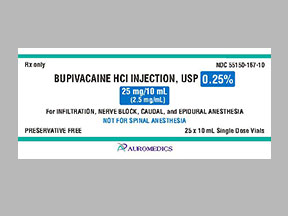
Bupivacaine (pf) Coupons & Savings Card – Discount Prices from $1.01
Generic for: Marcaine, Sensorcaine-mpf, Marcaine preservative free
Bupivacaine is a long-acting local anesthetic commonly used to numb specific areas of the body during surgical, dental, or obstetric procedures. It works by blocking nerve signals, preventing pain sensations without causing loss of consciousness. Bupivacaine is available in various forms, including solutions with or without preservatives. Preservative-free (PF) formulations are often preferred for certain procedures, such as spinal anesthesia, to reduce the risk of adverse reactions associated with preservatives. The onset of anesthesia with bupivacaine is typically rapid, occurring within minutes, and its effects can last from 2 to 8 hours, depending on the dose and method of administration. While generally safe when used appropriately, bupivacaine can cause side effects like low blood pressure, dizziness, or, in rare cases, more serious complications. Therefore, it should only be administered by trained healthcare professionals who can monitor and manage any potential adverse effects.
Our coupons are free to use. Before paying, show the pharmacist your Bupivacaine (pf) savings card to get your free discount. Use our filters below to edit the prescription box to match your needs. The Bupivacaine (pf) prices will update based on your prescription needs. Above our Bupivacaine (pf) coupons, you can change your location to see pharmacy prices and costs in other areas. We're here to help you buy Bupivacaine (pf) at the lowest price with our prescription discount card.
My prescription
Edit
10ML of 0.25%, Bupivacaine (pf) (1 Vial)
Select pharmacy

CVS
$20.37
COUPON PRICE
Walmart
$1.01
COUPON PRICE
Albertsons
$4.54
COUPON PRICE
Walgreens
$4.54
COUPON PRICEBupivacaine (pf) savings card
Show this card to your pharmacist
Walmart
$1.01
BIN
ID
PCN
GRP
019876
LH37F21767
CHIPPO
LHX
Powered by
Bupivacaine is a long-acting local anesthetic commonly used to numb specific areas of the body during surgical, dental, or obstetric procedures. It works by blocking nerve signals, preventing pain sensations without causing loss of consciousness. Bupivacaine is available in various forms, including solutions with or without preservatives. Preservative-free (PF) formulations are often preferred for certain procedures, such as spinal anesthesia, to reduce the risk of adverse reactions associated with preservatives. The onset of anesthesia with bupivacaine is typically rapid, occurring within minutes, and its effects can last from 2 to 8 hours, depending on the dose and method of administration. While generally safe when used appropriately, bupivacaine can cause side effects like low blood pressure, dizziness, or, in rare cases, more serious complications. Therefore, it should only be administered by trained healthcare professionals who can monitor and manage any potential adverse effects.
Our coupons are free to use. Before paying, show the pharmacist your Bupivacaine (pf) savings card to get your free discount. Use our filters below to edit the prescription box to match your needs. The Bupivacaine (pf) prices will update based on your prescription needs. Above our Bupivacaine (pf) coupons, you can change your location to see pharmacy prices and costs in other areas. We're here to help you buy Bupivacaine (pf) at the lowest price with our prescription discount card.
Bupivacaine (pf) dosage forms
Use our Bupivacaine (pf) 10ML of 0.25% coupon with prices from $1.01 for 1 Vial. You can also use our Bupivacaine (pf) 10ML of 0.5% coupon with prices from $1.01 for 1 Vial. We have a Bupivacaine (pf) 10ML of 0.5% coupon with prices from $1.01 for 2 Vials. You can use our Bupivacaine (pf) 10ML of 0.5% coupon with prices from $2.21 for 3 Vials.
Dosage Quantity Price from Per unit 10ML of 0.25% 1 Vial $1.01 $1.01 10ML of 0.5% 1 Vial $1.01 $1.01 10ML of 0.5% 2 Vials $1.01 $0.51 10ML of 0.5% 3 Vials $2.21 $0.74 10ML of 0.25% 2 Vials $1.01 $0.51 10ML of 0.25% 3 Vials $1.01 $0.34 10ML of 0.75% 1 Vial $1.01 $1.01 10ML of 0.75% 2 Vials $1.01 $0.51 10ML of 0.75% 3 Vials $1.01 $0.34
| Dosage | Quantity | Price from | Per unit |
|---|---|---|---|
| 10ML of 0.25% | 1 Vial | $1.01 | $1.01 |
| 10ML of 0.5% | 1 Vial | $1.01 | $1.01 |
| 10ML of 0.5% | 2 Vials | $1.01 | $0.51 |
| 10ML of 0.5% | 3 Vials | $2.21 | $0.74 |
| 10ML of 0.25% | 2 Vials | $1.01 | $0.51 |
| 10ML of 0.25% | 3 Vials | $1.01 | $0.34 |
| 10ML of 0.75% | 1 Vial | $1.01 | $1.01 |
| 10ML of 0.75% | 2 Vials | $1.01 | $0.51 |
| 10ML of 0.75% | 3 Vials | $1.01 | $0.34 |
